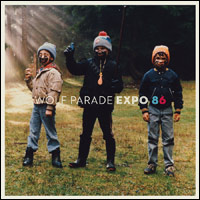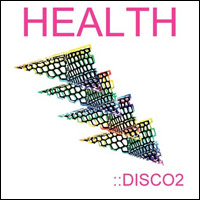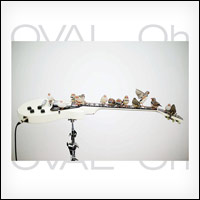
Expo 86
Sub Pop
Since when did Wolf Parade become a Sunset Rubdown side-project instead of the other way around? In 2005, the year each of Spencer Krug’s bands recorded its debut album, Wolf Parade exploded onto the scene as a fully formed beast, whereas Sunset Rubdown was a promising, yet inchoate, bedroom solo project. But with each successive release, Sunset Rubdown has gotten better and better, while Wolf Parade, in which Krug shares songwriting duties with Dan Boeckner, has been slowly approaching indie-rock oblivion. Their latest, Expo 86, is divided between Krug-penned tracks that sound like little more than Rubdown B-sides, and ’80s-tinged Boeckner songs that rarely justify their fist-pumping melodies and extended run-times.
Despite their overarching weirdness, Wolf Parade at their best employ relatively simple song structures that befit Boeckner’s pop instincts and help ground some of Krug’s stranger flights of fancy. But there’s hardly a verse-chorus-verse construction to be found on Expo 86. This works out fine for Krug, who writes multi-segmented epics in his sleep, but Boeckner is at his best when using the expected repetitions of rock & roll to milk maximum drama out of his songs. For example, “Palm Road” is a perfectly fine anthem in the tradition of Boeckner’s classic “Shine a Light,” but the song loses all its momentum when it starts to meander around the two-minute mark. Meanwhile, “Little Golden Age” and “Pobody’s Nerfect” suffer a similar fate; in fact, out of Boeckner’s contributions, only “Ghost Pressure” is strong enough to have the inertia to get the listener to the finish line.
As Wolf Parade begins to sound more and more like Sunset Rubdown, they become a much less interesting band. Gone is the tension between Krug’s mad scientist ways and Boeckner’s more traditional approach. On Expo 86, it sounds like both songwriters would rather be doing something else, and as listeners we can empathize.
David Holmes
MP3: “Ghost Pressure”

En Fin Tid
Smalltown Supersound
An except from a web search jokingly had this description of DiskJokke: “In case you didn’t know, this is a supergroup comprised of members of Mew, A-ha and Coldplay.” That actually doesn’t sound too bad (save for the Coldplay), though what DiskJokke really does deliver is also sometimes termed “prog disco,” a title that’s about as cool as one of those old Pink Floyd–inspired laser shows.
Luckily, the creativity of DiskJokke—a.k.a. Joachim Dyrdahl, a Norwegian trained violinist and former mathematician—comes in the form of a sound that’s both cutting edge and retro, drawing inspiration from Holger Czukay, Brian Eno, and Allan Parsons. DiskJokke received a lot of attention with his 2008 debut, Staying In, and for creating popular remixes for Lykke Li, Beck, Charlotte Gainsbourg and the much-hyped XX. Though he’s often lumped together with Lindstrøm and Prins Thomas, the comparisons among the talented trio are mostly due to geography and a general stamp of electronica rather than actual musical similarity.
Appropriately, ”Reset and Begin” seems to take a journey through electronica of the past, starting with a few clean synth notes and an unassuming, occasional beat before launching into with synthesized version of prog rock. This song displays DiskJokke’s inspiration from Krautrock influences like Tangerine Dream, yet it inexplicably reminds me of The Last Unicorn cartoon. Perhaps it’s the early ’80s influences at work. “En Fin Tid” is like a modernized trip on Kraftwerk’s “Autobahn,” though perhaps to some sunnier, more cheerful locales, progressing to the title track and “1987,” punctuated by pronounced melodies and dancefloor beats.Though there’s often a frenetic layering with much electronic music, DiskJokke doesn’t shy away from fashioning somewhat sparse landscapes, such as in “Rosenrød.” There’s the playful alien sounds in “The Bund,” melding, as DiskJokke so artfully does throughout the record, sounds of past, present and future.
Josie Rubio
MP3: “1987 (Radio Edit)”

Disco2
Lovepump United
Health is one of those bands with a uniquely millennial sensibility. Sure the Los Angeles quartet traffic in fractured and noisy rock, but they also aren’t afraid to get their boogie on. The first hint was the Crystal Castles’ remix of “Crimewave.” Then they went all the way by releasing Disco, which featured various producers remixing tracks from Health’s self-titled debut. The idea is hardly unique, but there’s definitely some type of post-something or other to having such diametrically opposed public personas. Don’t like the scruffy original version? Well, here’s the more put-together twin cousin. The gambit worked out so well for the group that they revisited the concept, with their second album, Get Color, re-imagined as the cleverly titled Disco2.
Much like with the last edition, marquee remixers are largely absent. There are two returning collaborators: Crystal Castles, who are better known for their own records then as remixers, and CFCF. Javelin, Gold Panda and Tobacco make sense, as Health doesn’t seem inclined to take the easy way out. Or perhaps they couldn’t find anyone who could take Get Color’s unwieldy tracks and reshape them into a coherent form. Still, Disco2 is largely unsuitable for the club. While Disco seemed to be all about re-imagining Health as the ’00s version of the Rapture, Disco2 is more on the chilled-out tip. The result is less disco and more next-morning comedown. The record kicks off in stellar fashion with “USA Boys” a brand new Health track produced by Alan Moulder, who has worked with or remixed everyone from My Bloody Valentine to the Eurhythmics and Nine Inch Nails. Instead of a jagged drum heavy workout, the result is a crisp, clean track threaded with ethereal vocals. It wouldn’t be inappropriate to see a gaggle of Goth girls doing a slow sway to “USA Boys” right around closing time.
But it’s not all mellow moments. Javelin turns in an early-90s R&B influenced version of “In Heat,” while both Pictureplane and Tobacco freak the funk out of their versions of “Die Slow.” But for the fans that need a bit more bite, the Crystal Castles’ take on “Eat Flesh” is just the right blend of angry drums and gossamer vocals. While Disco2 may not be as radical as its predecessor, it succeeds in presenting another take on Health. It will be interesting to see where the band goes from here.
Dorian S. Ham

Oh ep
Thrill Jockey
You could be easily forgiven for not knowing what exactly Oval is all about. Near Wikipedia-proof and sonically elusive, Oval’s always been “songs for the music-major,” IDM at its most hardcore, with digital glitches, hyperactive, overreaching drums, and ticky-tack electro. It’s not stuff with which the average listener can easily get down.
The Oh EP is the first time we’ve heard from the project since 2001’s Ovalcommers, and besides having the dubious honor of being one of the few 15-track records that can honestly justify itself as an EP (it’s running time barely scrapes 25 minutes), it’s not exactly a triumphant return. Oh is a harmless, unambitious foray that forgoes most of the elusive ambience and error-message beat-skips for which Oval has become known. Instead we get lots of live instruments, a first for Oval, and songwriting that ranges from prickly to straight-up illogical. Oval has always had a noisy knack for randomness, but it seemed as if it was always born out of necessity rather than pretension. Oh’s jagged sonic ramblings don’t seem to be informed by anything other than a need to be “difficult,” and as far as experimental music goes, that’s not a good sign.
Still, Oh is, once again, only 25 minutes long, and despite its faults, it’s still quite a departure from what the majority of electronic music has to offer. But you do have to wonder if, after such a long absence, Oval could have cooked up something a little more intriguing and a lot more vital. Oh well.
Luke Winkie

Cloud Cuckooland
B-Music
The latest compilation from rock rarities excavators B-Music, Cloud Cuckooland is an examination of the Kuckkuck (German for “cuckoo”) label begun by Eckart Rahn, a passionate music lover and industry worker who had started his own publishing company before beginning the label. Originally started in 1970 to release the debut album from Ihre Kinder, the band begun by Jonah and the Whales songwriter Sonny Hennig after that group broke up, Kuckkuck became a forerunner of the Krautrock movement. It helped that Rahn had the financial backing and distribution of Deutsche Grammaphone. The company gave Rahn carte blanche, and thus he was able to release a bevy of records spanning the gamut between psych freakouts, prog-rock extrapolations, and Moog mood pieces.
Cloud Cuckooland focuses on the label’s output in the years before Kuckkuck split with Deutsche Grammaphone in 1974. Henning and Ihre Kinder are well represented with one solo cut and three full-band tracks. The best of these is “Komm zu Dir,” a furry folky ditty accented with slight Eastern undertones. Sam Spence, an American ex-pat who also recorded library music, contributes three tracks of analog synth-pop as well, veering from the vaguely Morricone-like “Ringo” to the psychedelic oscillations of “Water World” and the dramatic, Axelrod-recalling “World As One.” But Rahn seems to have known best when it came to psych and other out-there forms. Armageddon comes off like a Germanic Mountain on “Oh Man” and Ernst Schultiz puts in a couple good turns with the pastiched “Paranoia Picnick” and “XY,” which sounds like the Fall and is just as indecipherable. Rahn proved that all that was needed was a good ear and a little ingenuity to build a lasting legacy, however unknown.
Stephen Slaybaugh
MP3: Armaggedon, “Oh Man”
ALBUM REVIEWS
To Rococo Rot, Speculation
Dead Luke, American Haircut
Ed Harcourt, Lustre
Stone Temple Pilots, Stone Temple Pilots
Casiokids, Topp Stemning på Lokal Bar
Foals, Total Life Forever
Woom, Muu's Way
Crystal Castles, Crystal Castles
Rayon Beach, Memory Teeth
Danger Mouse & Sparklehorse, Dark Night of the Soul
Pernice Brothers, Goodbye, Killer
Cave, Pure Moods EP
Sia, We Are Born
Deer Tick, The Black Dirt Sessions
